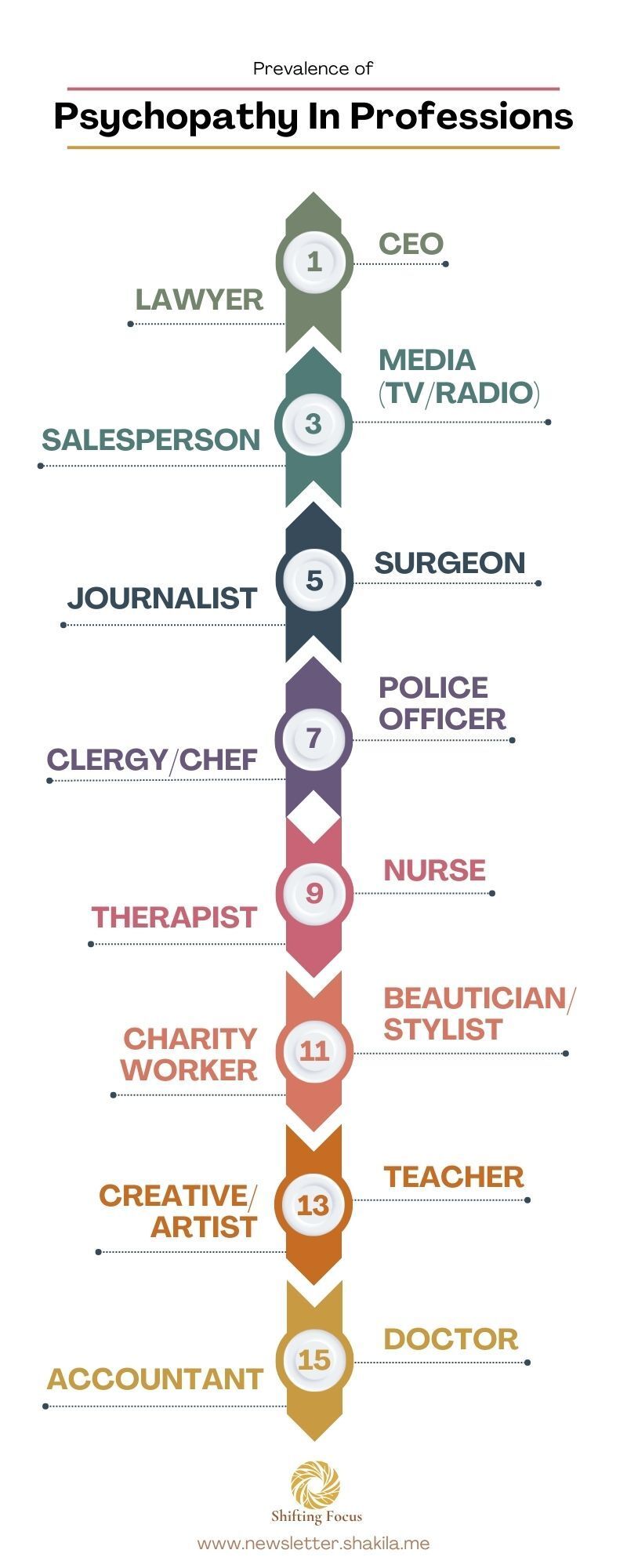- Shifting Focus
- Posts
- What Psychopaths Get Right
What Psychopaths Get Right
And You Should Steal From Them

Hi there,
I don’t know about you, but I’ve always admired people who move through the world with certainty. The kind who trust their gut, speak up without shrinking, and act without a fear filter.
That’s never been me.
I overanalyze everything. I replay, rehash, rehearse. I don’t leap. I calculate the jump, the landing, and the wind speed. I used to think that made me thoughtful. Now I’m not so sure.
That’s why when I read about a neuroscientist analyzing brain scans of violent criminals it got under my skin.
Rethinking What Psychopathy Means
Neuroscientist James Fallon was pouring over brain scans of violent criminals when he saw something chilling.
One scan lit up all the markers of psychopathy: low activity in the amygdala (emotional processing), lack of fear response, diminished empathy. The full deck.
He flipped it over to see whose brain it was.
It was his own!
Fallon wasn’t a murderer. He was a husband, a father, a successful scientist. He wasn’t devoid of a conscience, but he realized he had traits like cold rationality, boldness, emotional detachment that lined up uncomfortably well with the criminals he studied.
For him, that moment shattered a binary idea: that psychopathy = evil.
Psychopathy Exists on a Spectrum
Let’s be clear: full-blown psychopathy is no joke. It’s associated with antisocial behavior, lack of remorse, and criminal activity.
But psychopathy exists on a spectrum.
And sitting on that spectrum are traits that we reward in society:
— Charisma
— Composure under pressure
— Laser-sharp decision-making
— Strategic charm
— A steely resolve when others crumble
Traits that make for brilliant surgeons, fearless first responders, elite athletes, high-performing CEOs.
Oxford University researcher Kevin Dutton has even studied professions where psychopathic traits are overrepresented: surgeon, lawyer (hi 😯), journalist, police officer, clergy, and CEOs.
Turns out that psychopathy isn’t confined to prison cells or crime documentaries. It shows up in C-suites and corner offices too.

Rather than writing them off completely, maybe can we take from their playbook to borrow their tools and use them better?
Trait #1: Fearlessness Under Pressure
Psychopaths don’t experience fear the same way most people do. Their fight-or-flight system is under-active, especially in high-stakes situations. Which makes them unnervingly calm under pressure.
In the right context, that’s a superpower.
Imagine delivering a keynote speech without a trace of nervous sweat. Or handling a high-stakes negotiation without flinching. Or speaking your truth in a relationship even when your voice shakes.
It’s not being heartless, but having control over your heart rate when it matters.
Research show that low reactivity to stress can lead to better performance in high-stakes environments like the military or emergency medicine.
And the twist is we can train for it.
By using tools like mindfulness. Exposure therapy. Nervous system regulation. Strategic self-talk. They’re not woo-woo. They’re how we build our own version of “fearlessness” without losing our humanity.
Trait #2: Charm
Have you ever met someone who could talk their way into (or out of) anything?
They’ve hones this skill not because they’re loud. Or likable.
But because they’re locked in.
Psychopaths have that kind of presence. Not warm. Not cuddly. But focused, captivating, magnetic. You feel it when they walk into a room: no fidgeting, no over-explaining, no nervous laugh trailing behind them. Just pure, undistracted attention.
They know how to read people. They don’t just talk. They command. They study people like puzzles, mapping the quickest route to influence. They know when to lean in, when to stay silent, and exactly which version of themselves to deploy.
And if we remove the manipulation, what’s left is a skillset we all benefit from.
Because charm isn’t about being fake. It’s about being intentional.
The great communicators don’t just wing it. They craft it.
The real power is in the subtleties:
Holding eye contact just long enough
Pausing before you speak
Matching someone’s tone and tempo
Speaking plainly, without fluff or apology
These aren’t tricks. They are tools for leadership. And if used with integrity, it’s connection not control because it doesn’t just win people over. It makes them feel seen.
Psychopaths do this instinctively.
We can do it deliberately and ethically.
Trait #3: Strategic Emotional Detachment
This is where I used to get it wrong.
I used to think that that feeling deeply is what makes us good. Good friends. Good partners. Good siblings and a good person.
But it nearly broke me.
No one teaches you that unfiltered empathy can become self-abandonment. That without boundaries, caring can quietly mutate into collapse and burnout.
Psychopaths, ironically, don’t have this problem. They don’t get overwhelmed by emotion. They don’t carry what’s not theirs.
And while that absence of feeling is not the goal, their emotional distance offers a clue. Because there’s something in that composure worth studying.
Detachment isn’t the opposite of empathy. It’s clarity.
It’s what lets a surgeon focus during a trauma procedure.
It’s what allows a therapist to sit with deep pain without falling into it.
It’s what helps a parent stay regulated while their child comes undone.
Strategic detachment isn’t about being cold. It’s about staying clear.
“Between stimulus and response there is a space. In that space is our power to choose our response.”
That space is where everything changes. It’s where we remember that someone else’s storm isn’t yours to get swept up in. And where we stop confusing emotional flooding with connection.
And it’s where I’ve learned that the most powerful kind of presence… is one that doesn’t disappear in someone else’s pain.
READER POLL
Which “dark trait” do you secretly wish you had more of? |
Trait #4: Relentless Focus
Psychopaths are goal-driven to a fault. They don’t doubt. They don’t stall. They don’t waste energy wondering if they’re good enough or if now is the right time.
They don’t get bogged down in doubt or distractions. They fix their gaze, lock on, and move forward, with unrelenting focus.
Again, not recommending the full personality. But let me ask you this:
When was the last time you chased a goal without dissecting it to death?
When did you last move without needing a 12-step plan, a pep talk, and a sign from the universe?
There’s a dark kind of brilliance in single-mindedness.
It’s the athlete who trains in the rain while no one’s watching.
The founder who hears “no” a hundred times and still shows up.
The writer who keeps returning to the blank page, even when every word feels like pulling teeth.
Psychopaths have what psychologists call low behavioral inhibition.
They don’t overthink. They don’t hesitate. They just act.
We can borrow a slice of that.
Choose the action. Take the step. Send the pitch. Make the ask.
Not because you’re fearless. But because clarity lives on the other side of motion.
You don’t need to feel ready. You just need to start. The momentum will meet you there.
Final Thought
There was a writer back in the 60s, Alan Harrington, who thought that the psychopath was evolution’s next step. The next trick that natural selection has up its sleeve as society becomes faster and looser.
Maybe he was right? I don’t know.
But I do know that there are moments in life when softness isn’t enough.
When the meeting demands unshakeable presence. When the crisis needs clarity. When the relationship requires a hard boundary, not another apology.
In those moments, we need more than mindfulness.
We need edge. Fire. Command.
Not to dominate others, but to not be dominated by fear.
So why not take from the psychopath's playbook?
Steal their calm.
Study their charm.
Practice their clarity.
Adopt their focus.
And then do it with heart. Because the world doesn’t need more cold-blooded operators. It needs more people who know how to use their darkness… and still choose the light.
Lead with light,
Shakila

P.S. Here’s the results of last week’s poll.
Q: Looking back, when have you most wished you had trusted your gut?
🟧🟧⬜️⬜️⬜️ In a relationship (25%)
🟩🟩🟩⬜️⬜️ In a career move (30%)
🟩🟩🟩⬜️⬜️ In a big purchase decision(30%)
🟨⬜️⬜️⬜️⬜️ Before saying yes to something I knew wasn’t right (5%)
🟨⬜️⬜️⬜️⬜️ Every time I ignored it and knew better (10%)
Reader comments:
Sarah: Sadly, my gut seems to want to spend money way faster than my head would like it to!

Reply